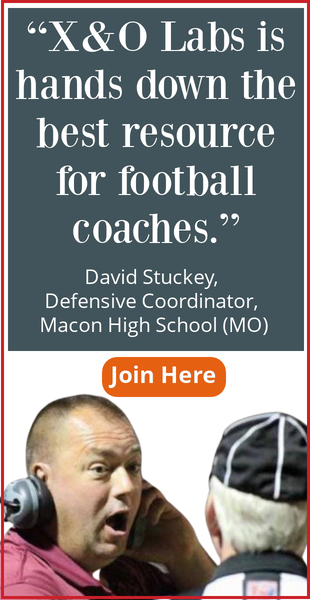By Chad Stadem
Head Coach & Offensive Coordinator
Washington High School (SD)
Twitter: @Mr_Stadem & @SFW_Football
This year will be my 6th year at Sioux Falls Washington, 16th year as a head coach, and 18th year total of coaching football. Every year I am looking to make our practices more efficient and effective. We as a staff work together to develop our practice plans, and I encourage our staff to come up with creative ways to teach the game of football in practices. Our vision is to play fast and practice fast. We do not believe in staying onto something too long. We keep moving. We believe that our practices should not take more than 2 hours and generally as we get late into the season our practices last under an hour and a half. We try and film each practice especially when we are in group or team periods. Filming those periods allows us to keep moving. We do not want to stop practice to walk over what just went wrong. We will coach on the fly and use the film the next day before practice to instruct or correct the issue.
A little about Washington
Sioux Falls Washington is a large school of around 2000 students. We have a freshman, junior varsity, and varsity teams. Our junior varsity practices with the varsity team and has their games on Monday’s. We are a two-platoon system and generally have no one playing both ways in our base offensive and defensive packages. We do have some personal packages on both the offense and defense. We do need to have periods when those players might need to work a group on the other side of the ball. We have a clock running on a board with periods listed and a horn will blow at the end of each period. Each period is 5 minutes in length and we try to stay at or below 24 periods for each practice. We believe that over two hours of practice is asking a lot from everyone on the team. If we do things right, we will even cut a period short and move forward. Almost every day we do not use the full 24 periods of practice time. The players see that as a reward for doing things right and encourages them to run with a sense of urgency the whole practice.
Period Simulation - Teach the game
Since we are a two-platoon team, we have the luxury of more time to teach the game. Most of my assistants formerly coached at the collegiate level and have experience with working with a two-platoon system. We always try to find ways to create a game simulation in our practice plans. We want to teach the game. We like to come up with different scenarios to help the team understand the importance of being successful in the game of football. We believe that game simulation periods break up the regular practice routine, and it helps generate game like intensity. At the beginning of the period, I will gather the teams together, discuss the scenario we are about to enter and ask the units what their focus should be in this scenario to be successful. Once the period is over, we meet as a team or our units and quickly discuss what we did right and what we need to do better at in that scenario. Then we move onto the next period on the practice plan.
We love the situational period for not only teaching the game, but it creates competitive intensity in our practices. Our offensive and defensive units take pride in winning these periods. These periods break up practice and allow the kids to play the game they love in a controlled environment.
Practice A and Practice B - Game Organization during a sudden change
We picked up this wrinkle to help generate accountability for our players. Practice A is a normal practice and we will follow the plan to the minute. Practice B alerts the team that I am about to create a game like a sudden change in practice. We got this idea from Jed Stugart while he was the head coach at the University of Sioux Falls. The focus is generally on special teams for us, but we will also use this on package groupings that require members from both the offensive and defensive units. As we practice I will blow a whistle and yell out a call for a unit to perform their task. That unit will sprint to the location I am at to complete the task. Everyone else will continue with the regular practice.
An example would be if I called for the PAT/FG team. I will blow a whistle, yell “Field Goal Team HOT!” and have a ball placed on the ground for the field goal attempt. “Hot” means the clock is running and they have 20 seconds with no mistakes to complete the field goal. Our special team’s coaches will run over with them counting down the seconds. This can be tough on our guys as we practice on 3 game sized practice fields and a large open area for our bigs. They need to know the unit they are on, their responsibility, and no mistakes allowed. Once this task is completed they will sprint back to what they were doing before the call for their unit.
I do this on my own and no one knows what group I will call for or when I will call for them during practice. It is like throwing a pop quiz onto the guys. It holds them accountable. I always tell the team that we should never have to call a timeout because someone doesn't know what unit he or she are on. If we do, then you will lose out on an opportunity to remain on that unit. You will be replaced. We require the players to know the depth chart as well. There are many times I will call for a unit and add that a certain member is out with a cramp or injury. The backup needs to know whom they are backing up and fill in if that person is out. Our expectations remain the same and we expect the task to be completed with no mistakes.









